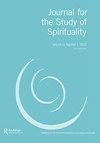Social work and spirituality: Reflecting on the last 20 years
IF 0.8
0 RELIGION
引用次数: 4
Abstract
ABSTRACT As an experienced social worker, but a new academic in the late 1990s, I was surprised how uncomfortable students felt naming how their Christian background influenced their interest in social work. Spirituality/religion was minimally expressed in the curriculum and there was little literature or related research, particularly in Australia. Here, I draw on my experience to reflect how this has changed, and the implications for social work practice and education. Within social work and the broader community, there has been a significant increase in literature and research related to spirituality/religion. However, despite religious tensions expressed in war, various abusive practices, and debates about religious freedom, social work education still provides little training for students about these issues. But we may be on the cusp of change. Research demonstrates that some clients value including spirituality in their lives, and in social work practice. Social workers are recognising that clients and communities for whom this is important need their support, including advocacy for their right to spiritual/religious expression. We need to affirm both the challenges and opportunities of including spirituality/religion in social work. Ways forward include being more explicit about spirituality/religion, modelling how to engage with this, and integrating spirituality/religion into a curriculum underpinned by critically reflective approaches. These, combined with intersectionality and critical cultural consciousness, can lead to social work practice that not only integrates this aspect of people's lives but is inclusive, holistic, respectful of the complexity of people's lives and adheres to principles of social justice.社会工作与灵性:近20年的反思
摘要作为一名经验丰富的社会工作者,但在20世纪90年代末还是一名新学者,我很惊讶学生们对说出他们的基督教背景如何影响他们对社会工作的兴趣感到多么不舒服。精神/宗教在课程中的表达很少,文献或相关研究也很少,尤其是在澳大利亚。在这里,我利用我的经验来思考这是如何变化的,以及对社会工作实践和教育的影响。在社会工作和更广泛的社区中,与精神/宗教有关的文献和研究显著增加。然而,尽管战争中表达了宗教紧张局势、各种虐待行为以及关于宗教自由的辩论,但社会工作教育仍然很少为学生提供有关这些问题的培训。但我们可能正处于变革的风口浪尖。研究表明,一些客户在生活和社会工作实践中重视精神。社会工作者认识到,对他们来说这很重要的客户和社区需要他们的支持,包括倡导他们的精神/宗教表达权。我们需要确认将精神/宗教纳入社会工作的挑战和机遇。前进的道路包括更明确地了解精神/宗教,建模如何参与其中,并将精神/宗教纳入以批判性反思方法为基础的课程中。这些,再加上交叉性和批判性文化意识,可以导致社会工作实践不仅融合了人们生活的这一方面,而且具有包容性、整体性、尊重人们生活的复杂性并坚持社会正义原则。
本文章由计算机程序翻译,如有差异,请以英文原文为准。
求助全文
约1分钟内获得全文
求助全文
来源期刊

Journal for the Study of Spirituality
RELIGION-
CiteScore
2.50
自引率
7.10%
发文量
25
期刊介绍:
Journal for the Study of Spirituality is a peer-reviewed journal which creates a unique interdisciplinary, inter-professional and cross-cultural forum where researchers, scholars and others engaged in the study and practices of spirituality can share and debate the research, knowledge, wisdom and insight associated with spirituality and contemporary spirituality studies. The British Association for the Study of Spirituality (BASS) organises a biennial international conference and welcomes enquiries about membership from those interested in the study of spirituality in the UK and worldwide. The journal is concerned with what spirituality means, and how it is expressed, in individuals’ lives and communities and in professional practice settings; and with the impact and implications of spirituality in, and on, social policy, organizational practices and personal and professional development. The journal recognises that spirituality and spiritual values can be expressed and studied in secular contexts, including in scientific and professional practice settings, as well as within faith and wisdom traditions. Thus, Journal for the Study of Spirituality particularly welcomes contributions that: identify new agendas for research into spirituality within and across subject disciplines and professions; explore different epistemological and methodological approaches to the study of spirituality; introduce comparative perspectives and insights drawn from different cultures and/or professional practice settings; aim to apply and develop sustained reflection, investigation and critique in relation to spirituality and spiritual practices; critically examine the values and presuppositions underpinning different forms of spirituality and spiritual practices; incorporate different forms of writing and expressions of spirituality.
 求助内容:
求助内容: 应助结果提醒方式:
应助结果提醒方式:


